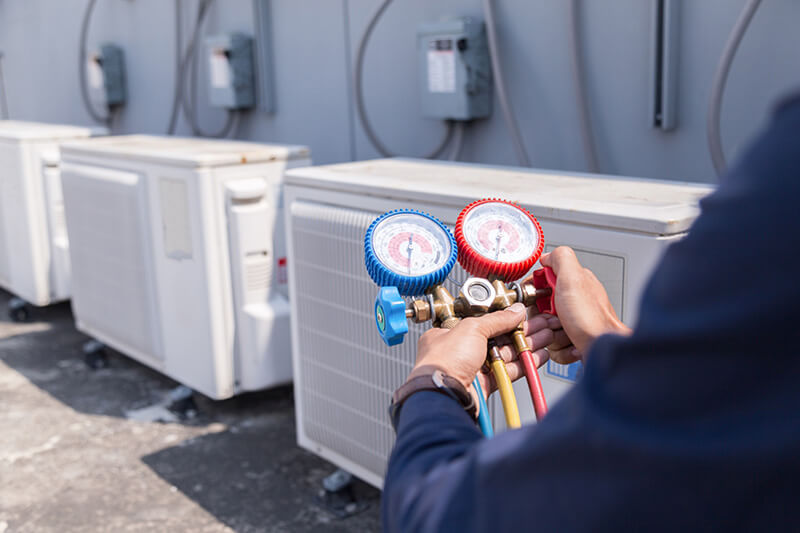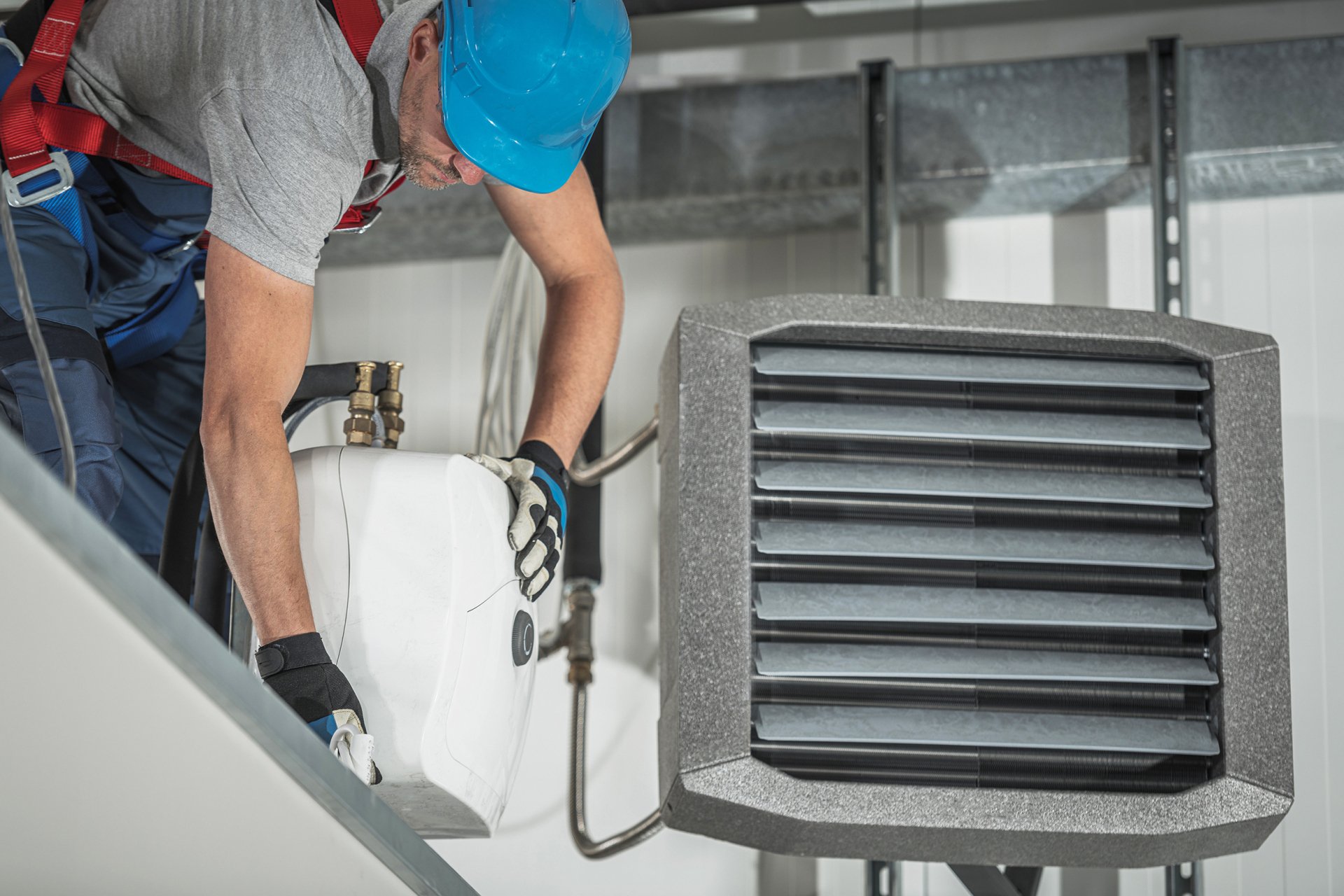Prevent Costly Repairs with Scheduled heat pump service
Prevent Costly Repairs with Scheduled heat pump service
Blog Article
Selecting In Between a Heatpump and Furnace: Secret Factors To Consider for Your HVAC Requirements
When reviewing heating choices for cooling and heating needs, the decision between a warmth pump and a furnace can be complicated. Each system uses distinctive benefits customized to certain environments and energy efficiency objectives. Recognizing these differences is necessary for making an enlightened selection. Trick variables such as setup expenses and environmental effect even more make complex the selection process. Which option absolutely lines up with one's convenience and sustainability preferences? The adhering to areas will check out these considerations thoroughly.
Understanding Heat Pumps: Exactly How They Work and Their Advantages
While lots of home owners consider numerous home heating options, recognizing exactly how heatpump function and their benefits can significantly influence their choice. Heatpump run by moving warm instead of generating it. In the wintertime, they remove warm from the outside air or ground and transfer it indoors, while in the summertime, they reverse this process, cooling the home by removing heat outside. This dual performance makes them flexible for year-round climate control.One of the main benefits of heatpump is their power efficiency. They utilize substantially much less electrical power compared to conventional heating systems, possibly resulting in lower utility expenses (heat pump installation ooltewah tn). Additionally, warmth pumps have a smaller carbon impact, making them an environmentally friendly selection. They additionally require less maintenance than conventional systems, contributing to long-term cost financial savings. Generally, comprehending the mechanics and benefits of heatpump can aid home owners make educated decisions regarding their home heating and cooling needs
Exploring Heaters: Kinds, Operation, and Advantages
Heating systems are available in different kinds, including gas, electric, and oil designs, each with distinct functional systems. Understanding these differences is essential, as they influence effectiveness and heating performance. Furthermore, heating systems use various benefits, such as constant warm output and dependability in cooler climates.
Sorts of Heaters
Furnace can differ considerably in style and procedure, with furnaces being a prominent option among homeowners. There are several sorts of heating systems, each using various fuel resources and innovations. Gas furnaces prevail, leveraging natural gas to create heat efficiently. Electric heaters, on the various other hand, make use of electric resistance to create heat, typically favored for their simple setup. Oil heaters, while less typical, are efficient in locations with limited gas access (heat pump service). Additionally, condensing heaters take full advantage of power effectiveness by recording and reusing exhaust gases. Each type operates through a system of heat exchangers and ductwork to distribute cozy air throughout a home. Recognizing the differences between these heating system kinds is vital for notified HVAC choices
Benefits of Heating systems
For property owners seeking trusted heat throughout cold months, the advantages of furnaces are substantial. Furnaces provide regular home heating, making certain also temperatures throughout the home. They are particularly effective in severe chilly, often outmatching heatpump in icy conditions. Various kinds, including gas, electric, and oil heating systems, provide flexibility to fulfill diverse requirements and preferences.Furnaces likewise have a tendency to have lower initial installation prices compared to heatpump, making them a more available alternative for many. Their robust design adds to a longer life-span, with several devices lasting over 15 years with proper upkeep. Additionally, modern-day heaters are commonly equipped with sophisticated innovation for boosted efficiency, which can lead to decreased energy bills. Generally, furnaces continue to be a dependable option for effective home heating.

Energy Effectiveness: Contrasting Heat Pumps and Furnaces
When comparing energy effectiveness in between heat pumps and furnaces, the Seasonal Energy Efficiency Ratio (SEER) plays a vital function in identifying efficiency. In addition, a functional price evaluation discloses the long-term financial implications of each system. Recognizing these variables can guide property owners in making educated choices about their home heating services.
Seasonal Power Effectiveness Proportion
Power performance plays a necessary role in the decision-making process in between heat pumps and heaters, especially when thinking about the Seasonal Power Performance Proportion (SEER) This statistics actions the cooling effectiveness of warm pumps over a whole cooling period, supplying a standard method to examine efficiency. Higher SEER ratings suggest greater energy effectiveness, converting to reduced power usage and decreased energy bills. On the other hand, heaters are commonly assessed using the Annual Fuel Usage Efficiency (AFUE) ranking, which mirrors home heating effectiveness. When contrasting these 2 systems, homeowners need to focus on SEER scores for heatpump, as they straight influence overall energy cost savings and environmental sustainability. A comprehensive understanding of SEER can significantly influence the lasting satisfaction and cost-effectiveness of the picked heating and cooling solution.
Functional Price Evaluation
Recognizing the operational prices related to heatpump and heaters is crucial for house owners reviewing their choices. Heatpump usually supply greater power effectiveness, converting electric energy into heat with marginal waste. This causes lower regular monthly utility costs, particularly in modest climates. Conversely, traditional furnaces, particularly gas versions, might have lower upfront prices however can sustain higher functional expenditures gradually because of sustain costs and effectiveness ratings.Moreover, heat pumps can operate as both heating and cooling down systems, possibly minimizing the need for different cooling and heating devices. While preliminary financial investments for warm pumps may be greater, their long-lasting financial savings in power effectiveness can make them a much more economical option for lots of houses. Careful evaluation of regional power rates is crucial to identify the finest alternative.
Installment Costs: What to Expect for every Furnace
Setup prices for furnace can vary significantly in between heatpump and heating systems, affecting homeowners' decisions. Warmth pumps usually have greater upfront setup prices, commonly ranging from $3,500 to $8,000, depending upon the system dimension and complexity of setup. This consists of the outside system, indoor handling system, and essential ductwork adjustments. Conversely, heaters often tend to have lower initial expenses, averaging between $2,500 and $6,000, which can be appealing for budget-conscious house owners. Installment expenditures can increase if considerable ductwork is required.Moreover, the option of fuel type for heaters-- all-natural gas, lp, or electrical-- can additionally influence setup costs. While warmth pumps use energy efficiency, their first investment might prevent some purchasers. Ultimately, assessing installment prices together with lasting financial savings and efficiency will assist homeowners in making educated choices about their heating unit.
Climate Considerations: Which System Does Better in Your Location
Just how do climate conditions influence the effectiveness of home heating systems? The efficiency of heatpump and heating systems can differ greatly relying on the regional environment. In moderate climates, warmth pumps stand out by efficiently transferring warmth from the outside air, making them an energy-saving choice. However, their effectiveness diminishes in very cool temperatures, where they might struggle to draw out enough warm. Alternatively, furnaces, particularly gas versions, give reliable and regular warm no matter outdoor conditions, making them better in cooler regions.In locations that experience milder winters, warm pumps More Info can run efficiently year-round, supplying both home heating and cooling. On the other hand, areas with rough winters typically take advantage of the effectiveness of heating systems. Inevitably, understanding the local climate is important when making a decision in between a warm pump and a heating system, as it directly affects their functional performance and total efficiency.
Upkeep Demands: Long-Term Take Care Of Warmth Pumps vs. Furnaces
While both warm pumps and furnaces call for routine maintenance to assure peak performance, their specific demands and care regimens differ considerably. Heaters typically require much less frequent interest, with yearly examinations sufficing to inspect for gas leaks, tidy filters, and examine general functionality. Their less complex layout commonly enables for straightforward repairs.In comparison, warm pumps demand semiannual upkeep as a result of their dual function in heating & cooling. This includes cleaning coils, inspecting cooling agent levels, and ensuring that both the indoor and exterior units work at their ideal. Additionally, heatpump maintenance usually includes even more intricate parts, making expert maintenance essential.Neglecting maintenance can cause diminished effectiveness and increased energy prices for both systems. Eventually, property owners should take into consideration these lasting treatment demands when picking between a warm pump and a furnace, as aggressive upkeep can extend the lifespan and performance of either system significantly.
Ecological Influence: Choosing a Sustainable Heating Choice
The ecological influence of furnace is a critical assessment for house owners looking for sustainable alternatives. Heat pumps are generally more energy-efficient than typical furnaces, as they transfer warm as opposed to create it, greatly minimizing carbon emissions. By utilizing sustainable power sources, such as air-source or geothermal heat pumps, home owners can additionally minimize their ecological footprint.On the other hand, gas heaters discharge greenhouse gases and contribute to air contamination, though they commonly give greater warm result. Innovations in modern technology have actually led to the development of high-efficiency heaters that decrease emissions.Ultimately, choosing a heating system includes weighing effectiveness against ecological effect. Property owners are encouraged to review regional energy resources useful reference and incentives for eco-friendly systems, making sure an option that straightens with both personal comfort and ecological obligation. The choice influences not just instant convenience yet likewise long-lasting sustainability and environmental health.
Frequently Asked Inquiries
For How Long Do Heat Pumps and Furnaces Generally Last?
The lifespan of heatpump generally ranges from 15 to 20 years, while furnaces can last in between 15 to three decades. Normal maintenance considerably influences their longevity and performance in giving heating options.
Can I Use a Heatpump in Extremely Cold Climates?
Warmth pumps can run in very cold environments, but their efficiency diminishes as temperature levels decline. In such conditions, supplemental home heating resources might be needed to preserve comfortable indoor temperature levels and guarantee peak efficiency.

What Is the Noise Level of Warmth Pumps Versus Furnaces?
The sound degrees of heatpump and heaters vary significantly. Normally, warmth pumps run even more silently than typical furnaces, making them more effective for those sensitive to sound, while furnaces might generate louder operational sounds throughout heating cycles.
Are Warmth Pumps Suitable for Both Heating & Cooling?
Heatpump are without a doubt suitable for both home heating and cooling (heat pump installation ooltewah tn). They operate by moving heat, supplying efficient temperature level control year-round, making them a functional choice for home owners seeking an all-in-one cooling and heating solution
What Dimension Heating Unit Do I Need for My Home?
Establishing the ideal size heater for a home needs evaluating factors such as square video footage, insulation quality, regional climate, and the home's design. Consulting a professional can ensure an accurate assessment and optimal convenience. Heat pumps typically provide greater power efficiency, converting electrical power into warmth with very little waste. In moderate climates, heat pumps i thought about this excel by successfully moving heat from the outside air, making them an energy-saving alternative. Conversely, heaters, especially gas versions, provide reliable and constant warm regardless of outdoor problems, making them more effective in cooler regions.In locations that experience milder wintertimes, warmth pumps can run efficiently year-round, supplying both heating and air conditioning. Warmth pumps are generally more energy-efficient than typical heating systems, as they move warm rather than generate it, significantly minimizing carbon emissions. By utilizing renewable energy sources, such as air-source or geothermal heat pumps, property owners can even more lessen their environmental footprint.On the other hand, all-natural gas heating systems emit greenhouse gases and contribute to air contamination, though they often supply higher heat outcome.
Report this page